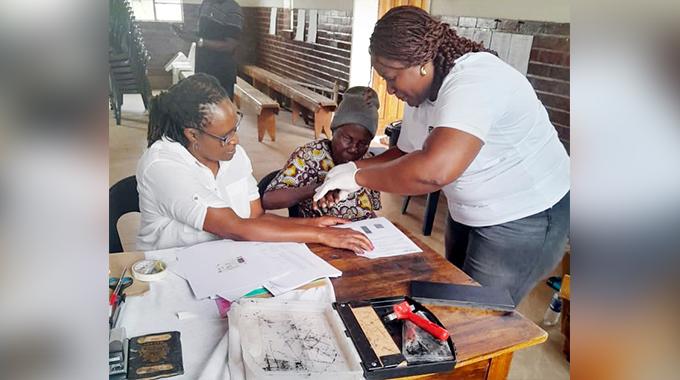News / National
Malawi rolls out dual citizenship to Malawians living in Zimbabwe
25 Oct 2024 at 07:46hrs |
0 Views

For 59-year-old Ms. Rita Kasichi, a Zimbabwean of Malawian descent, the dream of visiting her extended family in Malawi is finally within reach after being unable to acquire a passport for decades. Born in Mhangura in 1965, Ms. Kasichi faced years of hardship as a stateless person, unable to access essential services or travel due to her lack of citizenship. Now, thanks to a registration drive by the Malawian Embassy, she and others like her will soon hold dual citizenship.
Embassy officials have spent the past five days stationed at a local church in Bulawayo's Nguboyenja suburb, assisting residents of Malawian origin in registering as dual citizens of both Zimbabwe and Malawi. This registration drive, conducted in partnership with the United Nations High Commissioner for Refugees (UNHCR), has also extended to other regions across Zimbabwe, including Gweru, Gwanda, and Harare.
Ms. Kasichi expressed relief and joy over the recent development. "Being declared stateless was the most difficult period of my life because I could not acquire a national identity document, get formal employment, or even open a bank account. I had to resort to informal trade to make a living and take care of my two children," she said. In 2014, she made the difficult decision to renounce her Malawian citizenship to obtain a Zimbabwean ID, but she remained classified as an "alien."
Now, she is eagerly anticipating her first visit to Malawi, having already shared the news with family in Kasungu District. "I'm so excited. I can't wait to go and see my family and visit Malawi for the very first time," she said.
Her brother, Mr. Enock Kasichi, also plans to use his new Malawian travel documents to secure passports for his children so they can meet their extended family. "Our father used to tell us stories about life in Kasungu, but we never had the chance to visit our motherland," he said, adding that the dual citizenship will strengthen family ties and allow for regular visits.
Malawi's Second Secretary (Immigration), Mr. Sebastian Golody Lichapa, explained that the dual citizenship registration is aimed at individuals of Malawian descent born outside Malawi after 5 July 1964 to at least one parent from Malawi. The Government of Malawi, under a recent amendment to its Constitution, now allows dual citizenship, simplifying the process for Malawians living abroad who meet specific criteria.
According to Mr. Lichapa, "Half of the Malawian population in Zimbabwe has Zimbabwean passports, and our government thought it wise to give them dual citizenship." The application process requires proof of Malawian ancestry, such as old passports, marriage certificates, or national identity documents.
The registration drive in Bulawayo has been well-received, with many locals of Malawian descent coming forward. "This is an ongoing exercise, and we encourage as many people as possible to come forward," said Mr. Lichapa.
The initiative offers new hope for individuals like Ms. Kasichi and Mr. Kasichi, who can now finally connect with family and their cultural roots, bringing an end to decades of uncertainty and statelessness.
Embassy officials have spent the past five days stationed at a local church in Bulawayo's Nguboyenja suburb, assisting residents of Malawian origin in registering as dual citizens of both Zimbabwe and Malawi. This registration drive, conducted in partnership with the United Nations High Commissioner for Refugees (UNHCR), has also extended to other regions across Zimbabwe, including Gweru, Gwanda, and Harare.
Ms. Kasichi expressed relief and joy over the recent development. "Being declared stateless was the most difficult period of my life because I could not acquire a national identity document, get formal employment, or even open a bank account. I had to resort to informal trade to make a living and take care of my two children," she said. In 2014, she made the difficult decision to renounce her Malawian citizenship to obtain a Zimbabwean ID, but she remained classified as an "alien."
Now, she is eagerly anticipating her first visit to Malawi, having already shared the news with family in Kasungu District. "I'm so excited. I can't wait to go and see my family and visit Malawi for the very first time," she said.
Malawi's Second Secretary (Immigration), Mr. Sebastian Golody Lichapa, explained that the dual citizenship registration is aimed at individuals of Malawian descent born outside Malawi after 5 July 1964 to at least one parent from Malawi. The Government of Malawi, under a recent amendment to its Constitution, now allows dual citizenship, simplifying the process for Malawians living abroad who meet specific criteria.
According to Mr. Lichapa, "Half of the Malawian population in Zimbabwe has Zimbabwean passports, and our government thought it wise to give them dual citizenship." The application process requires proof of Malawian ancestry, such as old passports, marriage certificates, or national identity documents.
The registration drive in Bulawayo has been well-received, with many locals of Malawian descent coming forward. "This is an ongoing exercise, and we encourage as many people as possible to come forward," said Mr. Lichapa.
The initiative offers new hope for individuals like Ms. Kasichi and Mr. Kasichi, who can now finally connect with family and their cultural roots, bringing an end to decades of uncertainty and statelessness.
Source - the chronicle
Join the discussion
Loading comments…
































